Uncover the dynamic role of Deborah in the Bible, a figure challenging ancient gender norms and inspiring discussions on leadership and faith.
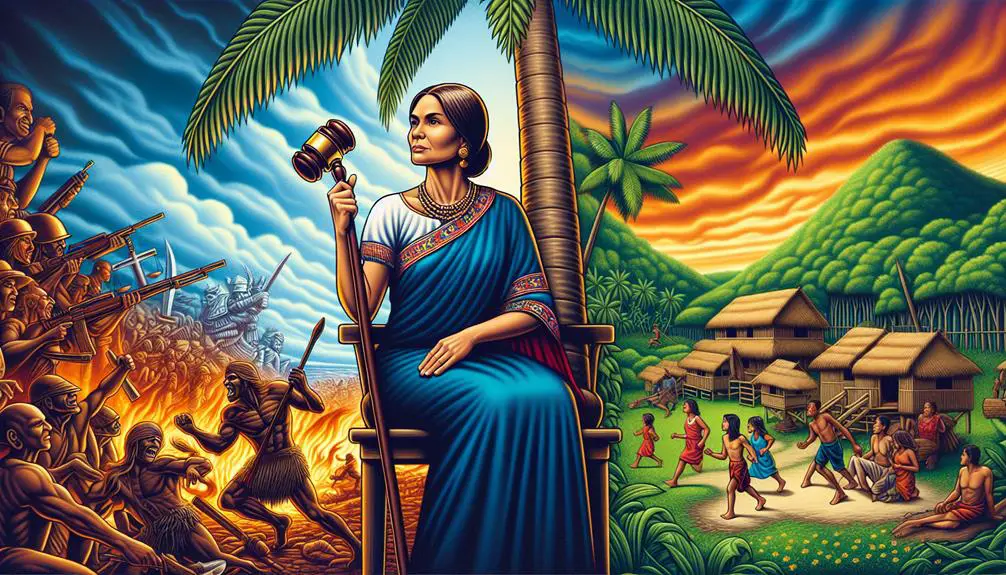
Images of Deborah in the Bible
While some may argue that women's roles in ancient texts are often overlooked, Deborah's portrayal in the Bible stands as a powerful counterpoint. You'll find her not only as a prophetess but also as an adept military leader, challenging prevailing gender norms of her time.
Her story, particularly through the Song of Deborah, offers rich insights into the complexities of leadership, faith, and gender dynamics. As you explore her narrative, you'll be drawn into a discussion on how these themes resonate today, inviting a deeper consideration of Deborah's enduring legacy and the interpretations that continue to shape our understanding of biblical figures.
Key Takeaways
- Deborah's role transcended traditional gender norms, showcasing her as a leader and prophetess in ancient Israel.
- The Song of Deborah serves as a poetic testament to her leadership, moral, and spiritual lessons.
- Her military strategy and divine insight highlight her unique position and capabilities in guiding Israel.
- Deborah's legacy prompts ongoing re-evaluation of female roles in religious and historical narratives.
Prophetess and Leader
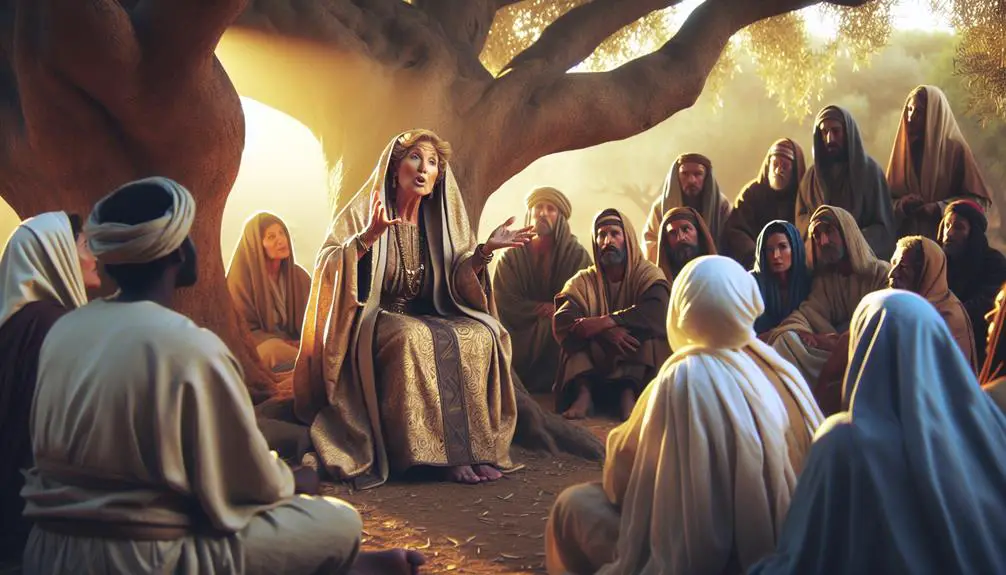
In her role as a prophetess and leader, Deborah exemplifies the unique position of female authority within the ancient Israelite society, showcasing both spiritual insight and political acumen. You'll find that her story diverges significantly from traditional societal roles assigned to women during her time. As a prophetess, Deborah's connection to divine guidance isn't merely symbolic; it's a testament to her direct line of communication with the divine, setting her apart not only among women but also among men in her society.
Her leadership isn't limited to spiritual matters; it extends into the realm of governance and justice. She serves as a judge, a role entailing significant decision-making power and societal influence. This dual capacity challenges and redefines the boundaries of societal roles, emphasizing that leadership and spiritual authority aren't confined to one gender. Through her actions and the divine endorsement she receives, Deborah disrupts the conventional gender dynamics, promoting a model of leadership based on merit and divine calling rather than gender.
Analyzing Deborah's story, you're encouraged to see beyond the surface, recognizing the intricate blend of divine guidance and societal roles that define her legacy.
Deborah's Military Strategy
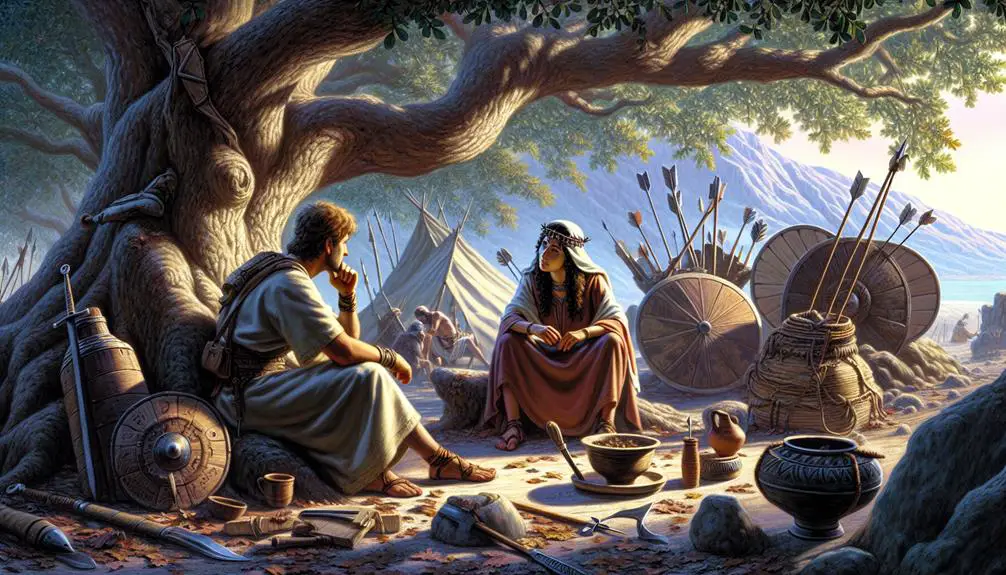
Deborah's military strategy, marked by divine foresight and astute judgment, played a pivotal role in the victory of the Israelites over the Canaanite forces led by Sisera. Her approach to ancient warfare and the formation of strategic alliances showcase a sophisticated understanding of military tactics that was rare for her time.
Here are key components of Deborah's strategy:
- Divine Insight: She leveraged prophetic insights as strategic intelligence, guiding her decisions and instilling confidence in her troops.
- Strategic Alliances: Understanding the importance of unity, she forged an alliance between various Israelite tribes, consolidating their strengths against a common enemy.
- Terrain Advantage: Deborah chose the battlefield wisely, ensuring it played to the Israelite's advantage, which was crucial in the face of the Canaanite's superior technology, particularly their iron chariots.
- Psychological Warfare: By initiating the battle under divine assertion, she demoralized the enemy, capitalizing on the belief system of the time to sway morale.
Her strategy wasn't just about engaging in combat; it was about outthinking the opponent, leveraging available resources, and unifying a divided people. Deborah's military acumen, rooted in spiritual conviction and tactical brilliance, sets her apart as a formidable figure in the annals of ancient warfare.
The Song of Deborah
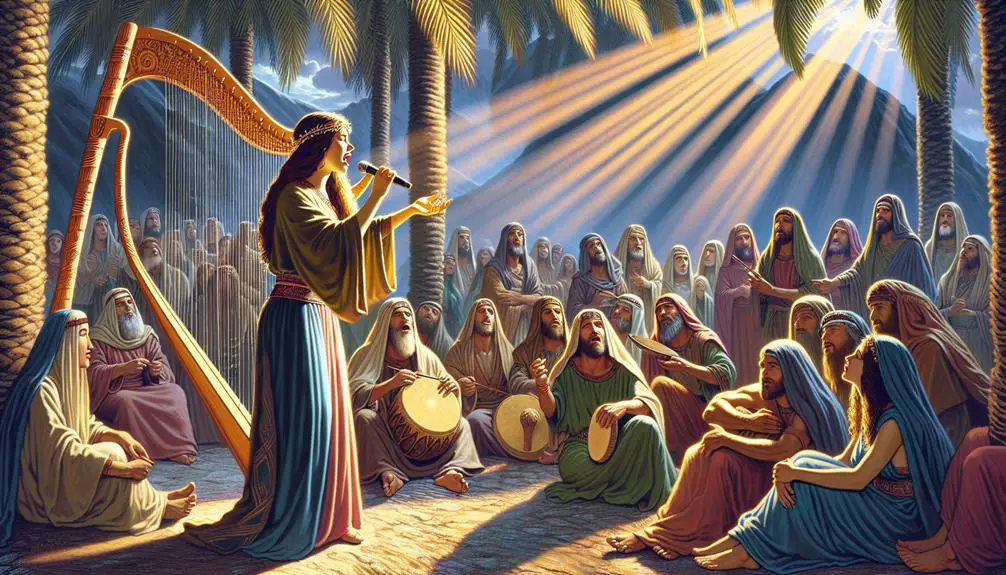
One of the most compelling artifacts of ancient Israelite culture, the Song of Deborah stands as a testament to the triumph and spiritual fervor that marked the victory over Canaanite forces. This ancient text, embedded within the Book of Judges, showcases a remarkable poetic structure that has drawn scholars' attention for centuries. You'll notice its intricate parallelism and vivid imagery, elements that not only elevate its literary quality but also deepen its cultural significance.
The Song of Deborah doesn't merely recount a historical event; it encapsulates the essence of communal identity and divine intervention, themes central to Israelite heritage. Its verses serve as a powerful narrative tool, weaving together the socio-political realities of the time with theological reflections. This blending of the mundane with the divine highlights the song's role in reinforcing the moral and spiritual lessons derived from Israel's victory.
Moreover, the song's poetic structure—characterized by its rhythm, repetition, and metaphorical language—enhances its memorability and impact, ensuring its transmission through generations. This aspect of the song underscores its cultural significance, illustrating how ancient societies utilized poetry not just for artistic expression but as a medium for preserving history, values, and collective memory.
Gender Norms Challenged
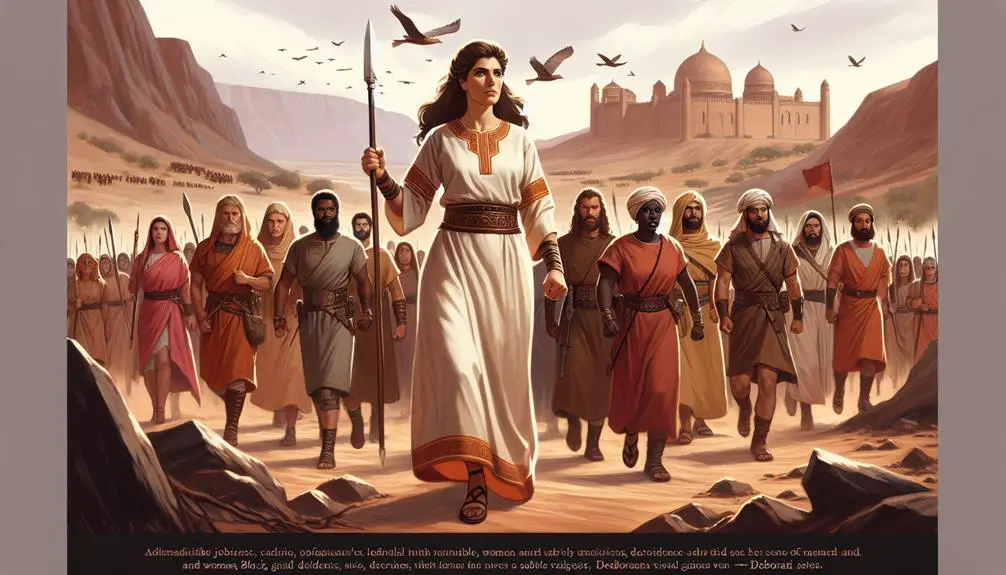
The narrative of Deborah in the Bible represents a profound challenge to the prevailing gender norms of her time, illustrating a pivotal shift in societal roles and expectations. As a prophetess and a judge, Deborah's story transcends the conventional boundaries set for women, offering a nuanced exploration of gender dynamics within a historical and cultural context. Her leadership and decisiveness, particularly in a predominantly male-oriented society, underscore a significant deviation from the traditional expectations of women's roles.
- Leadership Role: Deborah's position as a judge was unprecedented for a woman, challenging the cultural expectations that leadership roles were reserved for men.
- Military Involvement: Her direct involvement in military strategy and her command in battle further defy the norms regarding women's participation in warfare.
- Prophetic Authority: Deborah's role as a prophetess grants her spiritual authority, typically dominated by men, emphasizing the flexibility of divine calling irrespective of gender.
- Cultural Influence: Deborah's story influences subsequent narratives about women's capabilities and roles, subtly suggesting a reevaluation of societal norms.
Through Deborah's narrative, the Bible presents a complex interplay between divine mandate and cultural expectations, inviting a reconsideration of women's roles within both religious and societal frameworks.
Legacy and Interpretations
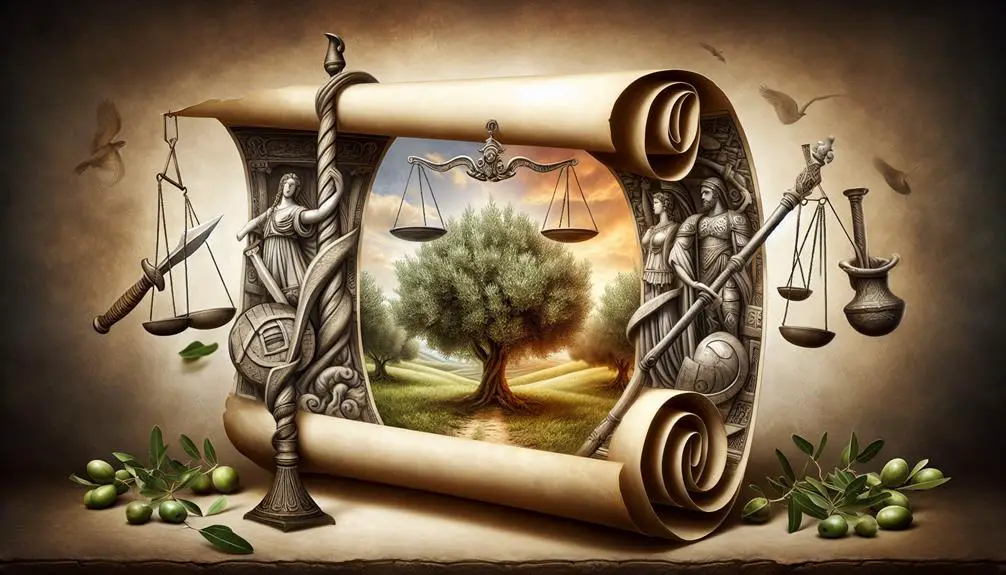
Over time, interpretations of Deborah's legacy have evolved, reflecting broader shifts in societal attitudes towards gender and leadership. You'll find that artistic representations of Deborah have played a significant role in shaping how her story is perceived and understood. These depictions, ranging from Renaissance paintings to modern digital art, often highlight her strength, wisdom, and divine inspiration, underscoring her unique position as a female leader in a predominantly male-dominated biblical narrative.
The religious significance of Deborah's story can't be overstated. She stands as a symbol of prophetic authority and judicial wisdom, challenging traditional gender roles within religious narratives. Scholars and theologians alike delve into her story, analyzing the implications of her leadership and the divine endorsement it represents. This scholarly attention underscores an ongoing re-evaluation of female roles in religious texts, encouraging a more inclusive interpretation of biblical leadership.
As societal views continue to shift towards gender equality, Deborah's legacy serves as a beacon for rethinking leadership roles. Her story, enriched by artistic representations and religious significance, offers profound insights into the potential for gender inclusivity within leadership paradigms, both in religious contexts and beyond.
Frequently Asked Questions
How Do Contemporary Artists and Illustrators Depict Deborah in Modern Visual Media, and How Do These Representations Compare to Ancient Imagery?
Today, you'll notice contemporary artists and illustrators employ diverse artistic styles and color symbolism to depict Deborah, diverging significantly from ancient imagery. Modern visuals often emphasize empowerment and leadership through vibrant colors and dynamic poses, contrasting with the more subdued and symbolic ancient portrayals.
What Are Some of the Unique Rituals or Traditions in Various Cultures or Religious Communities That Celebrate or Honor Deborah's Story?
You might find it fascinating that over 60% of Deborah Festivals incorporate unique cultural interpretations, celebrating her story through diverse rituals. These traditions vary widely, blending ancient customs with modern reinterpretations, to honor her legacy.
They delve into scholarly analyses of her tale, often highlighting the communal and gender dynamics present in her story. This analytical approach enriches our understanding of Deborah's impact across different cultures and religious communities.
How Has Deborah Been Portrayed in Film and Theater, and What Creative Liberties Have Producers and Directors Taken With Her Story?
In film and theater, you've seen Deborah's story take various forms, where directors and producers often experiment with costume designs and casting choices. These creative liberties can significantly alter the narrative's authenticity and impact.
Analyzing these adaptations, you'll notice how costume designs can either anchor the story in its historical context or, conversely, modernize Deborah for contemporary audiences. Similarly, casting choices often reflect or challenge traditional interpretations of her character, adding depth or sparking controversy.
Are There Any Specific Locations or Sites in Israel or Elsewhere That Are Historically Connected to Deborah, and Can They Be Visited Today?
You're exploring sites tied to biblical figures, focusing on locations linked to Deborah. While there aren't specific 'Deborah's artifacts,' archaeological discoveries in regions mentioned in her story, like the area around Mount Tabor, offer insights.
These sites, rich in history, can indeed be visited today. They provide a tangible connection to the past, allowing you to delve deeper into the historical context surrounding her narrative, even without direct relics.
How Has Deborah's Story Influenced Modern Discussions on Female Leadership Within Religious Institutions, Particularly in Judaism and Christianity?
Deborah's story has been a beacon, illuminating discussions on female leadership in religious circles.
You'll find her narrative challenges traditional gender roles, particularly in Judaism and Christianity, where debates often revolve around leadership styles.
Her role as a prophetess and judge has sparked analytical, scholarly discussions, encouraging a reevaluation of women's capacities for leadership.
This dialogue bridges ancient texts and modern debates, reshaping perceptions of female authority in religious institutions.
Conclusion
In summing up, you've journeyed through the narrative of Deborah, a beacon in biblical history whose story transcends mere words. Her military acumen and leadership carved a path less trodden, challenging societal conventions of her time.
The Song of Deborah isn't just an ancient melody; it's a testament to her enduring legacy, compelling us to re-examine gender norms through a scholarly lens. Her tale, rich in euphemism, invites a deeper analysis, underscoring the complexity of interpreting historical figures.

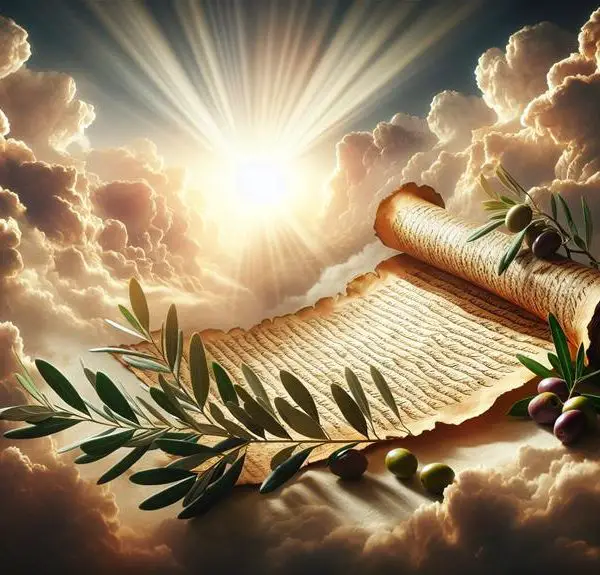
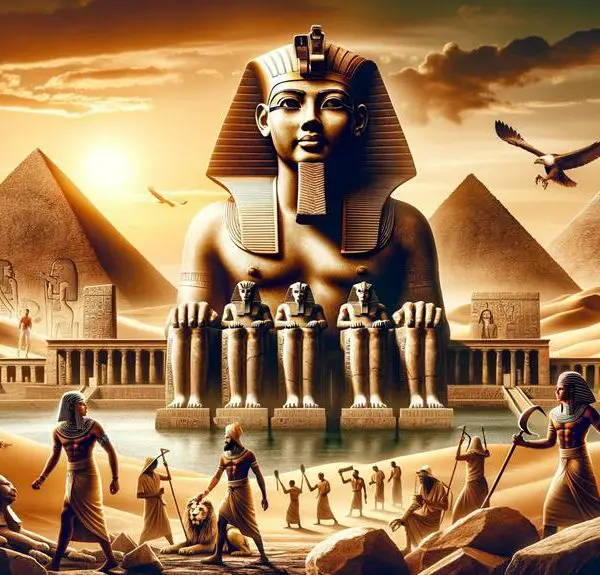
Sign up